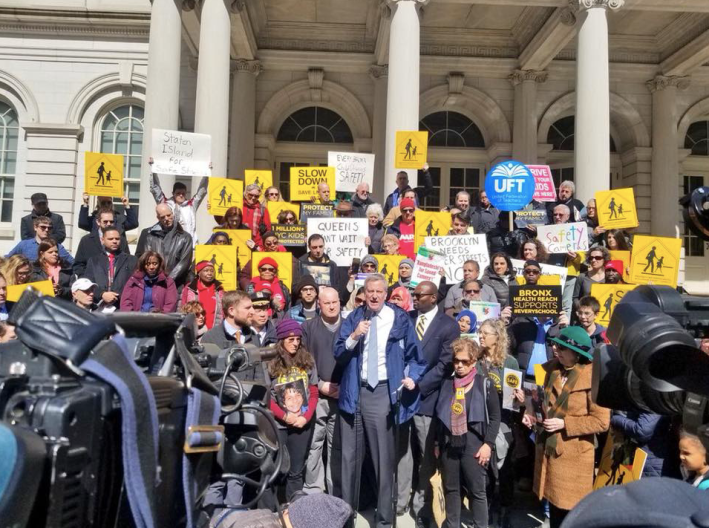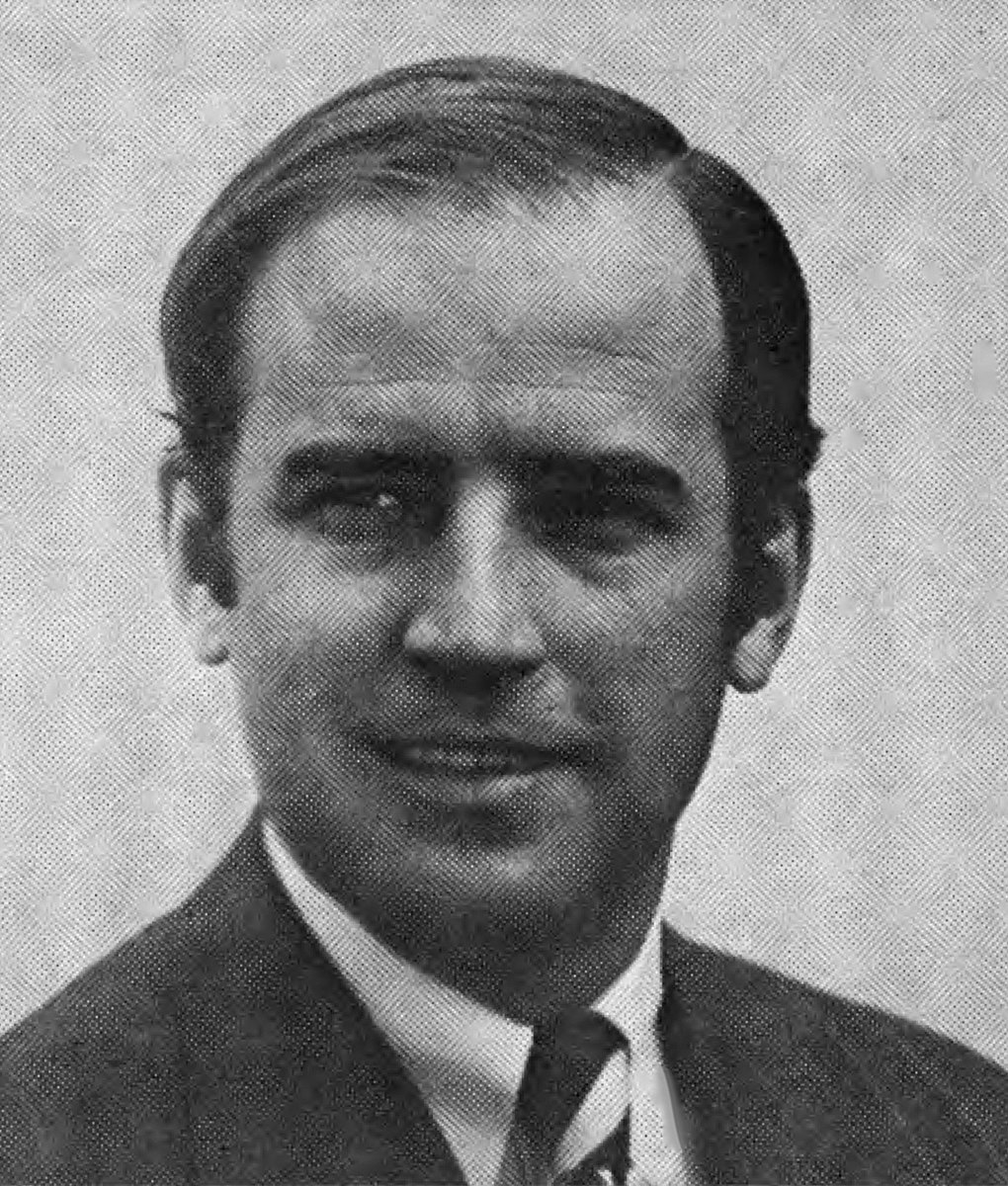It's easy to forget exactly how Democratic Presidential nominee Joe Biden began his political career: with a swearing-in ceremony at the hospital bedside of his two young sons, Hunter and Beau, who were fighting to survive in the aftermath of a car crash that had claimed the lives of his first wife, Neilia, 30, and his 1-year-old daughter Naomi.
Joe Biden taking his Senate oath at the bedside of son Beau—injured in the crash that killed Biden's wife & daughter. pic.twitter.com/bqOlRCAMfS
— Judge Don Willett (@JusticeWillett) May 31, 2015
Even among safe streets advocates, astonishingly few Americans know about this deeply formative chapter of Biden's story — because Biden himself rarely speaks of it. And when he has, he has not sounded like a man who knows in his bones that the collision could have been prevented by the policies introduced by powerful Washington decision-makers ... like him.
In a 2015 Yale commencement speech, Biden seemed to cast blame for the collision that killed half of his young family on the actions of a sentient vehicle — echoing a phrasing that too many journalists use to report on car "accidents" even when a driver has been held legally responsible, and that grieving families unfortunately internalize and repeat as they try to process the unthinkable loss of their loved ones.
My wife and three children were Christmas shopping, a tractor trailer broadsided them and killed my wife and killed my daughter. [Emphasis ours.]
And when Biden has sought to locate someone to hold responsible for the crash, he has misplaced the blame. In a 2007 interview, the then-senator claimed that the driver of the tractor trailer "allegedly — and I never pursued it — drank his lunch instead of eating his lunch" — but the driver, Curtis Dunn, was not drunk, and was not charged with any crime in connection with the crash. Because Neilia Biden reportedly mistook the intersection where she and her family were struck for a four way stop — it was actually a two-way stop, an often dangerous design that is correlated with high collision rates — and because police suspected she was distracted by her two young sons in the back seat, she drove into the path of the other driver.
Officers deemed the ensuing crash an "accident."
Biden later apologized to Dunn's daughter for the false claim. But in the years since, he has never really spoken out on who — or what systemic forces — he does blame for the death of his wife and daughter. He has never mentioned the role that bad road design played in the tragedy. And he certainly has not spoken to how he might still use his political power to prevent other families from enduring unthinkable losses like his — losses that have not stopped in the nearly 48 years since Neilia and Naomi lost their lives.
The difference between a survivor and an activist
Biden, of course, isn't the only prominent occupant of the White House who has lost loved ones to the preventable epidemic of traffic violence.
President Obama's father, Barack Hussein Obama, Sr., was the victim of a horrific sequence of traffic crashes — one in 1970 that impaired his mobility for the rest of his life, a second at some point in the mid-‘70s that resulted in a double leg amputation, and a third in 1982 that caused his death.
In 2010, First Lady Laura Bush, wife of George W., revealed that she killed another teenage driver when she ran a stop sign at 17 years old, an event that purportedly haunted her throughout her life and marriage; Bill Clinton's biological father was also killed in a traffic crash when his car tire blew out on a Missouri roadway and hurled him into a drainage ditch, three months before the future president was born.
All of these powerful people have said in their memoirs that their brushes with traffic violence deeply shaped their lives' trajectories — but like many of the grieving families created by our violent car culture, they have not seemed to recognize that their loved ones could have been saved with better policy.
“There are three types of grieving and traumatized families we encounter when their loved ones are first killed or seriously injured — and the first one, and probably most of the people we meet or who never come to us are those who view traffic crashes as accidents," said Amy Cohen, co-founder of Families for Safe Streets, a coalition of surviving family members that confronts traffic violence through advocacy and support services. "They don’t always see a path to advocacy, because, well, their loved one's death was an ‘accident’ or perhaps an act of God. They may be so overwhelmed with grief and just do not see that there was anything that could have stopped it. Or, if they do think that death could have been prevented, they think keeping that one, bad driver off the road would have been enough. Even I didn’t realize that traffic violence was an epidemic that was preventable — until it happened to me."

Cohen lost her own child, 12 year-old Sammy Cohen Eckstein, when a reckless driver struck him in a Brooklyn crosswalk in 2013. In the years since, she became an activist to end traffic violence, she's worked to help support countless other grieving parents and family members — and help them see that their pain can become a force for change.
"The second group is people who just have yet to realize that there even is an outlet for advocacy out there to end roadway deaths," she says. But Cohen notes that victim and survivor visibility can help. "We’re in the media, and every time one of our members appears wearing a Families for Safe Streets t-shirt, we get calls from people who didn't realize that there was a place to put their pain, and they want to get involved."
Still, Cohen understands that not all families will become activists — and our cultural attitude towards grief have a lot to do with it.
"But then there's the third group: the people who find it too painful to publicly speak out in their grief. But our pain will last a lifetime. We will always be broken, on some level. But for me, and for so many others, speaking out is a path forward. By saving others the heartache we face, it also helps us to find a meaningful path forward."
It's not clear which category of surviving family members candidate Biden falls into — but it is clear that his silence on traffic violence has been painful to other survivors. Tiffanie Stanfield, the founder of family support and advocacy nonprofit Fighting Hit and Run Driving, says that the families she works with frequently report being re-traumatized when their elected officials fail to speak up — or use their voices to perpetuate stigma.
"When I started reading about what Biden went through, it was triggering to me, and not just because it triggered memories of losing my sister," Stanfield says. "One of the most profound and painful experiences I've ever had was hearing district attorney Robert McCullough, shortly after her death, stand up and say 'sometimes, unfortunate accidents happen.' Him saying that helped trigger me to activism — but for other people, [statements like that] can trigger them to want to put their pain a box."
But even after years of suppressed grief, some families still find their way to safe streets activism — and advocates say it's truly never too late to join the cause.
"We have members who come to us 10, 20 years after their loss. Many tried to pushed the pain away but it was not working," Cohen says. "For many of our members the advocacy is a lifeline, even after all that time."
A need for a national plan
Nearly 48 years after the deaths of his wife and daughter, Biden may still never become a member of an organization like Families for Safe Streets. But no matter who wins the Oval Office, our next president will be poised to use his power to take historic action to end traffic violence — and without that kind of vision, advocates fear the epidemic will not end.
During the primaries, Families for Safe Streets launched the #EndTrafficViolence campaign to get presidential hopefuls from all political parties to release comprehensive plans to end traffic violence nationwide. Despite dogged attention from activists on social media and at campaign event, neither Biden nor Trump have responded to their efforts so far.
If Biden's silence on how he'll end the traffic violence epidemic has not made advocates optimistic, the incumbent's comments have more often elicited outright rage in the broader advocacy community.
When the wife of an American diplomat killed a 19 year-old motorcyclist in the United Kingdom while driving on the wrong side of the road and then fled the country to avoid legal consequences, Trump called the crash a "terrible accident" and publicly defended the criminally reckless driver, noting that failing to operate a multi-ton vehicle in the designated right of way "can happen" because "those are the opposite roads."
And early in the COVID-19 pandemic, the president openly compared the emerging crisis to the traffic violence epidemic — because just like 36,000 preventable roadway deaths we experience each year, the coronavirus death toll might be necessary to maintain the U.S. economy.
“And you look at automobile accidents, which are far greater than any numbers [of potential COVID-19 deaths] we’re talking about,” Trump said. “That doesn’t mean we’re going to tell everybody no more driving of cars. We have to do things to get our country open.”
Whoever wins in November, Cohen says that Families for Safe Streets will keep pressuring them to deliver a plan to make sure that no one else ever loses a loved one to our toxic car culture.
"We call on both Trump and Biden, parent to parent, to say that it’s time to act," Cohen says. "They all need to step up. We demand a plan to end the silence on traffic violence — because the silence has been going on long enough."






